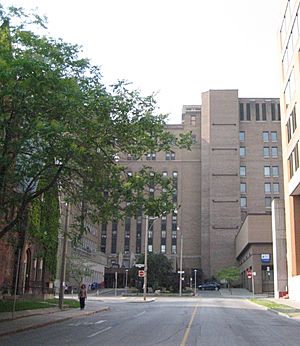Women's College Hospital facts for kids
Quick facts for kids Women's College Hospital |
|
|---|---|
 |
|
| Geography | |
| Location | 76 Grenville Street Toronto, Ontario M5S 1B2, Ontario, Canada M5S 1B2 |
| Organisation | |
| Care system | Medicare |
| Hospital type | Teaching |
| Affiliated university | University of Toronto |
| Services | |
| Emergency department | No |
| Speciality | Women's Health |
| History | |
| Founded | 1883 (Original Site, as Women's Medical College)
1911 (Second Site, as Women's College Hospital and Dispensary) 1915 (Third Site, as Women's College Hospital and Dispensary) 1935 (Current Site, Renovated 2015) |
| Closed | 1911 (Original Site)
1915 (Second Site) 1935 (Third Site) |
Women's College Hospital is a special teaching hospital in Toronto, Ontario, Canada. It is located in downtown Toronto on a street called Hospital Row, where many big hospitals are found. Today, it is an independent hospital that focuses on 'ambulatory care'.
Ambulatory care means that patients can have surgeries, tests, and treatments without staying overnight. They can go home within 18 hours and recover there.
This hospital is all about women's health, doing important research in this area, and providing ambulatory care. The World Health Organization even named it the only 'collaborating centre' for women's health in the entire Western Hemisphere!
Women's College Hospital works closely with the Women's College Research Institute, the Women's College Hospital Foundation, and a helpful website called Women's Health Matters. This website offers information on women's health and lifestyle issues in two languages.
Contents
History of the Hospital
Women's College Hospital started a long time ago, in 1883. It was first known as Woman's Medical College. On June 13, 1883, Dr. Emily Stowe led a meeting in Toronto. She was the second woman allowed to practice medicine in Canada.
Dr. Stowe believed that women needed to be able to study medicine. She said that there should be places for them to learn. Less than six months later, on October 1, 1883, Toronto's Mayor A.R. Boswell officially opened Woman's Medical College.
Amazing Women Leaders
Many incredible women have led the way at Women's College Hospital. Here are a few:
- Dr. Jessie Gray – She was one of the best cancer surgeons in North America. She was also the first woman in Canada to earn a Master of Surgery degree.
- Dr. Marion Powell – She helped people understand more about women's health related to having babies.
- Dr. Henrietta Banting – She was a leader in using mammography, a special test to check for breast cancer.
- Dr. Anna Marion Hilliard – She helped create a simpler Pap test, which checks for cancer.
- Dr. Ricky Kanee Schachter – She was the first woman to lead a university department focused on skin health.
- Dr. Minerva Reid – She was the first female Chief of Surgery in North America.
Ontario Medical College for Women
In 1895, the college joined with another school in Kingston, Ontario. Its name changed to the Ontario Medical College for Women. In 1898, a clinic called the Dispensary opened in Toronto.
This clinic allowed women patients to see women doctors. At that time, most doctors were men. The clinic helped everyone, even if they could not pay. Medical advice was always free.
In 1906, the University of Toronto started letting women study medicine. Because of this, the Ontario Medical College for Women closed. But the Dispensary stayed open and kept helping people in the city.
Recent Times at the Hospital
Women's College Hospital moved to its current location in Toronto in 1935. In 1961, it became a teaching hospital connected with the University of Toronto.
Later, in 1998, the hospital joined with Sunnybrook Health Sciences Centre and another hospital. It was called "Sunnybrook and Women's College Health Sciences Centre." But in 2006, they separated. Women's College Hospital went back to its original name.
During the SARS outbreak in 2003, Women's College Hospital opened Canada's first clinic for people with SARS who did not need to stay overnight.
The hospital was named a National Historic Site of Canada in 1995. A special plaque was put up to remember its importance. The plaque says:
Women's College Hospital has earned a distinctive place in Canadian medical history. From its beginnings as a small out-patient clinic in 1898 to its development as a modern teaching hospital, the institution symbolizes the struggle of women to claim their place in the medical profession. It offered them opportunities in teaching and in hospital practice, which were often unavailable or extremely limited elsewhere in the country. The hospital has made innovative contributions to the treatment and diagnosis of disease through its vital focus on health issues affecting women and families.
Canadian Prime Minister Justin Trudeau visited the hospital on March 7, 2024.
About Women's College Hospital
Women's College Hospital helped create the simpler Pap test. It also opened Ontario's first regional clinic to help people who have experienced violence. It was the first hospital in the province to use mammography to find breast cancer.
Since 2012, it has been Ontario's first and only independent 'ambulatory care' centre. Remember, ambulatory care means treatments and surgeries where patients do not need to stay overnight. They can go home within 18 hours to recover.
The Hospital Building
The hospital's current site used to have three buildings. These were built in 1935, 1956, and 1971. All of them were taken down and replaced by a single new building. This new building was finished in 2015.
The 1935 building was a tall, 10-storey building with a special design called Art Deco. Even though it was historically important, it was taken down to make way for the new hospital.
Learning and Education
Women's College Hospital is a teaching hospital connected with the University of Toronto. Research here focuses on how differences between men and women affect their health. This helps doctors understand why women might have different health needs.
The hospital also received money to teach health care workers about vaccines. This program helps people who work in long-term care homes and provide care at home.
Important Research
The Women's College Research Institute (WCRI) is the only one of its kind at a Canadian hospital. It is fully dedicated to women's health. Researchers from around the world study breast cancer, bone health, older women's health, and how violence affects women's lives.
Dr. Steven Narod, a scientist at WCRI, was part of a team that made a huge discovery. They found the BRCA1 and BRCA2 genes, which are linked to breast cancer risk. This was a major breakthrough in cancer research. His work has changed how doctors worldwide understand and test for genes related to breast and ovarian cancer.
Special Treatments and Clinics
- After Cancer Treatment Transition Clinic: Women's College Hospital and Princess Margaret Hospital created Canada's only clinic for cancer survivors. It helps people after their cancer treatment.
- Virtual Ward: This program helps patients who cannot come to the hospital regularly. A health team works with them using technology. It was the first 'virtual ward' in North America.
- CACE Complex Care Clinic: This clinic opened in 2015. It focuses on providing 'ambulatory care' using a team approach. This means different types of health experts work together to help patients.
- Bay Centre for Women's Health: This centre specializes in health care for women's bodies and having babies. It is located near the main hospital in Toronto.
Women's College Hospital Timeline
| Date | Event |
|---|---|
| 1883 | Woman's Medical College opens. |
| 1911 | Women's College Hospital and Dispensary opens. It was a seven-bed hospital where women doctors could practice medicine. |
| 1947 | The hospital helped create the simplified Pap test for finding early signs of cancer. |
| 1948 | The first Cancer Detection Clinic in Ontario opened here. |
| 1963 | WCH was the first hospital in Ontario to use mammography to find breast cancer. |
| 1971 | WCH partnered to create Canada's first teaching program for people with diabetes that did not require staying overnight. |
| 1971 | Canada's first special care unit for babies needing intensive care opened at WCH. |
| 1973 | The Bay Centre for Women's Health opened. It was the first walk-in clinic supported by a hospital. |
| 1976 | The Psoriasis Education and Research Centre opened. It was the first in Canada to focus on patients taking care of themselves. |
| 1977 | The Henrietta Banting Breast Centre opened. It focuses on treating, educating, and researching breast diseases. |
| 1981 | The special care unit for babies became the first Regional High-Risk Pregnancy Unit in Canada. |
| 1984 | WCH opened the first regional clinic in Ontario to help people who have experienced violence. |
| 1987 | The Urgent Care Centre opened. It was the first of its kind in Ontario. |
| 1987 | The Brief Psychotherapy Centre for Women opened. It was Canada's first outpatient therapy program. |
| 1988 | The Regional Women's Health Centre opened. |
| 1988 | WCH delivered Canada's first test-tube quintuplets (five babies born at once). |
| 1991 | The Ricky Kanee Schachter Dermatology Centre opened for skin research, education, and patient care. |
| 1991 | WCH launched Toronto's first clinic for colorectal cancer. |
| 1994 | Canada's first clinic for osteoporosis (a bone disease) that used many different types of doctors opened. |
| 1995 | WCH was named a World Health Organization Collaborating Centre in Women's Health. It was the first in this part of the world. |
| 1996 | The Environmental Health Clinic opened. It is the only one of its kind in Ontario. |
| 1996 | Canada's first heart health program just for women was started. |
| 2000 | The website www.womenshealthmatters.ca was created. It was the first hospital-based health information website for women. |
| 2001 | The Response Centre and the 23-Hour Day Unit opened. |
| 2002 | The Labyrinth opened. It was Canada's first and only hospital-based labyrinth (a special path for walking and thinking). |
| 2003 | Canada's first SARS Assessment Clinic opened at Women's College. |
| 2006 | WCH became Ontario's only academic hospital focused on women's health and ambulatory care. |
| 2008 | The hospital completed Canada's first breast implant reconstruction in a single surgery. |
| 2009 | The Centre for Headache opened. It is Ontario's only hospital-based centre for headaches. |
See also
- Elizabeth Bagshaw
- Margaret McKellar
- Helen Bell Milburn
- Hannah Emily Reid
- Ricky Kanee Schachter
- Emily Stowe
- Marjorie Davis
 | John T. Biggers |
 | Thomas Blackshear |
 | Mark Bradford |
 | Beverly Buchanan |



